

* The EU targets Chinese manufacturers like BYD and Geely, as well as Western producers such as Tesla that export cars from China to Europe.
* Data shows that around 20 percent of all-electric cars sold in the EU last year were made in China. Over half of these were from Western carmakers like Tesla, Dacia, and BMW, produced in China for export.
* China and the EU have a history of beneficial cooperation in the EV sector, exemplified by several successful joint ventures throughout the EV industrial and supply chains.
by Xinhua writers Cui Li, Zhang Zhaoqing, Liao Lei
BRUSSELS, June 13 (Xinhua) -- The European Commission on Wednesday revealed the provisional duties it plans to impose on imports of battery electric vehicles (EVs) from China, a move expected to impact bilateral economic cooperation and hinder the EU's green transition.
The pre-disclosed provisional duties, ranging from 17.4 percent to 38.1 percent in addition to the standard 10 percent vehicle duty already in place, are due to apply from July 4, according to the Commission.
China's Ministry of Commerce on Wednesday expressed strong dissatisfaction with the EU's plan to impose such duties, describing the move as disregarding facts and World Trade Organization rules.
Such action is "blatant protectionism" that will create and escalate trade frictions, said a spokesperson with the ministry, adding that it not only undermines the legitimate rights and interests of China's EV industry but also disrupts and distorts the global automotive industrial and supply chains, including those in the EU.
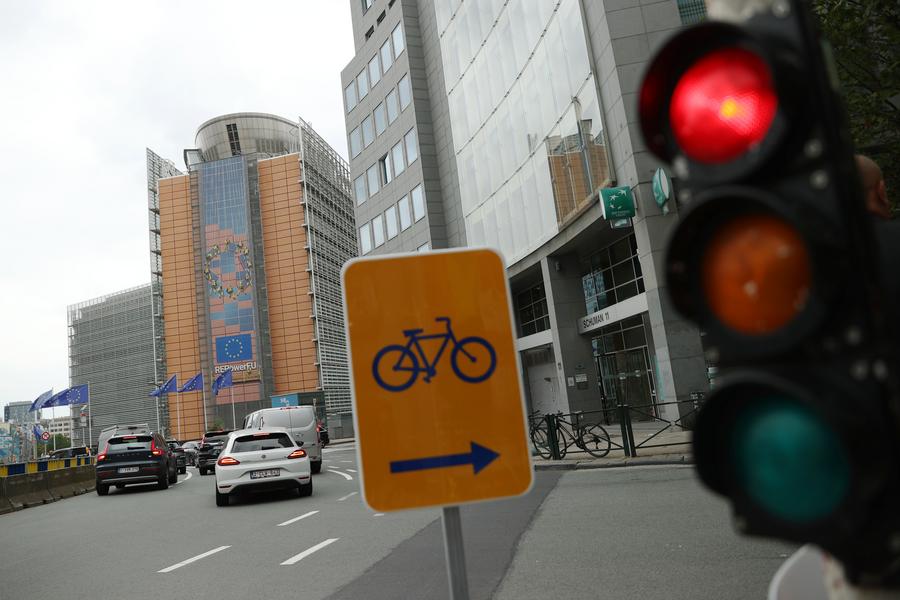
This photo taken on June 3, 2024 shows vehicles passing by the European Commission building in Brussels, Belgium. (Xinhua/Zhao Dingzhe)
PROTECTIONIST MOVE TO BACKFIRE
Following Washington's recent increase of duties on Chinese EVs to 100 percent, the EU targets Chinese manufacturers like BYD and Geely, as well as Western producers such as Tesla that export cars from China to Europe.
Officials, executives and scholars have expressed reservations about this investigation and the move to impose higher duties.
Norway's Finance Minister Trygve Slagsvold Vedum, as reported by Bloomberg, emphasized that the country will not join the EU's tariff increase on Chinese electric cars. "Introducing tariffs on Chinese cars is neither relevant nor desirable for this government," he said.
German Transport Minister Volker Wissing said on social media platform X that punitive tariffs from the European Commission are hitting German companies and their top products. "Vehicles must become cheaper through more competition, open markets and significantly better location conditions in the EU, not through trade wars and market isolation."
Hungarian Minister for National Economy Marton Nagy said in a statement that the Hungarian government "does not agree with punitive tariffs, as protectionism is not the solution."
Advocating for cooperation and competition, he said, "instead of restricting competition between manufacturers through punitive tariffs, we should support and help the European electric vehicle industry to become more competitive on a global level."
BMW CEO Oliver Zipse slapped the Commission's plan, arguing that it would harm European companies and interests.
"This decision for additional import duties is the wrong way to go," he said. "From the BMW Group's point of view, protectionist measures, such as the introduction of import duties, do not contribute to successfully competing on the international market."
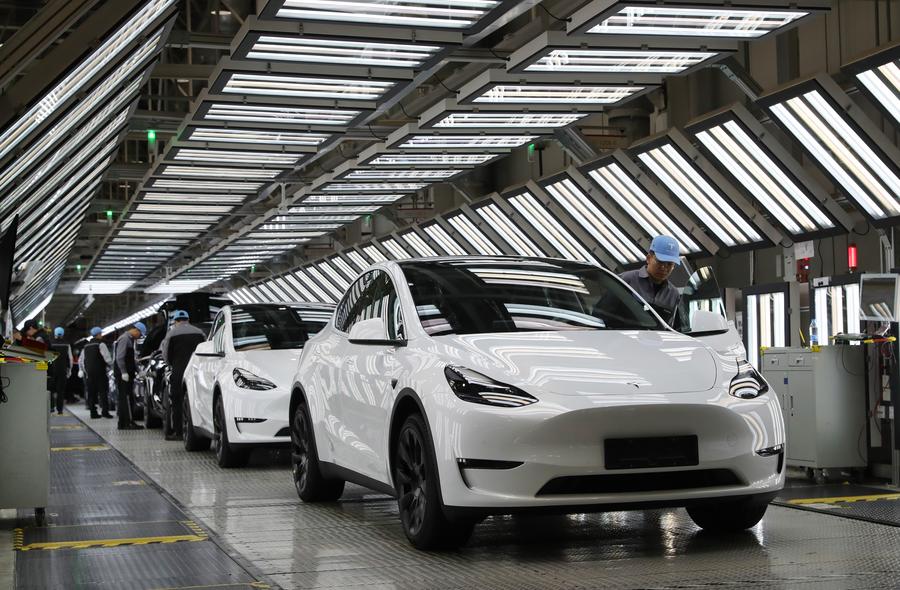
Employees work at Tesla's Shanghai Gigafactory in east China's Shanghai, Dec. 22, 2023. (Xinhua/Fang Zhe)
For the first time since October 2022, German car manufacturers and their suppliers assessed their current business situation negatively, and "remain pessimistic for the coming months," the Munich-based Ifo Institute for Economic Research said last week.
The EU tariffs on imports of Chinese EVs would backfire with a "noticeable impact on bilateral trade and production in Europe," according to the Kiel Institute for the World Economy (IfW Kiel).
IfW Kiel published the results of a simulation showing that with tariffs of 20 percent, EV imports from China would fall by 25 percent. With China exporting fewer EVs, its demand for inputs for production from the EU will also fall.
EU exports to China in "motor vehicles and parts" could decline by 0.6 percent, or 237 million U.S. dollars, it said. Overall, EU exports to China would fall by over 600 million dollars without China having responded with its own tariff measures.
Chinese Foreign Ministry Spokesperson Lin Jian warned Wednesday that China will take all measures necessary to firmly defend its lawful rights and interests.
To levy additional tariffs violates market economy principles and international trade rules, disrupts China-EU economic and trade cooperation and the global automotive industrial and supply chains, and will eventually hurt Europe's own interests, he said.
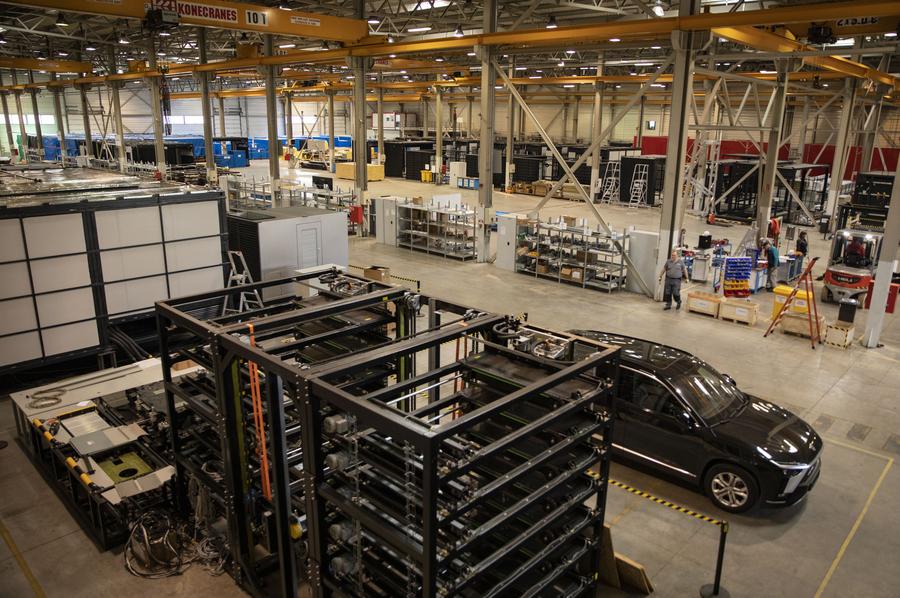
This photo taken on March 18, 2024 shows a view of the NIO Power Europe Plant in Biatorbagy, Hungary. (Xinhua/Zhang Fan)
CONSUMERS, CLIMATE FALL VICTIM
According to statistics from the European Federation for Transport and Environment, around 20 percent of all-electric cars sold across the EU last year, or 300,000 units, were made in China. More than half of them come from Western carmakers, such as Tesla, Dacia and BMW, which produce them in China for export.
Increasing tariffs on Chinese EVs are expected to have significant repercussions for EU consumers and the bloc's environmental goals.
President of the Federation of German Wholesale, Foreign Trade and Services, Dirk Jandura, said that market participants, consumers and companies would ultimately emerge as the losers if the tariffs were imposed.
"For consumers, this is likely to result in higher prices for electric vehicles because production within the EU is significantly more expensive than in China," said Julian Hinz, a trade researcher at the IfW Kiel. "Only healthy competition to produce a quality and affordable product can sustain the world economy."
The just-concluded EU elections, which saw a rise in far-right sentiment, indicate that voters are increasingly concerned about high inflation and rising energy costs due to the Ukraine conflict. The tariffs could exacerbate these concerns by increasing EV prices, which may also hinder the EU's goal of achieving carbon neutrality.
Croatian political analyst Kresimir Macan expressed concern about the broader implications of the tariffs on the global green transition. He said that such measures could undermine efforts to stimulate the production of environmentally friendly cars.
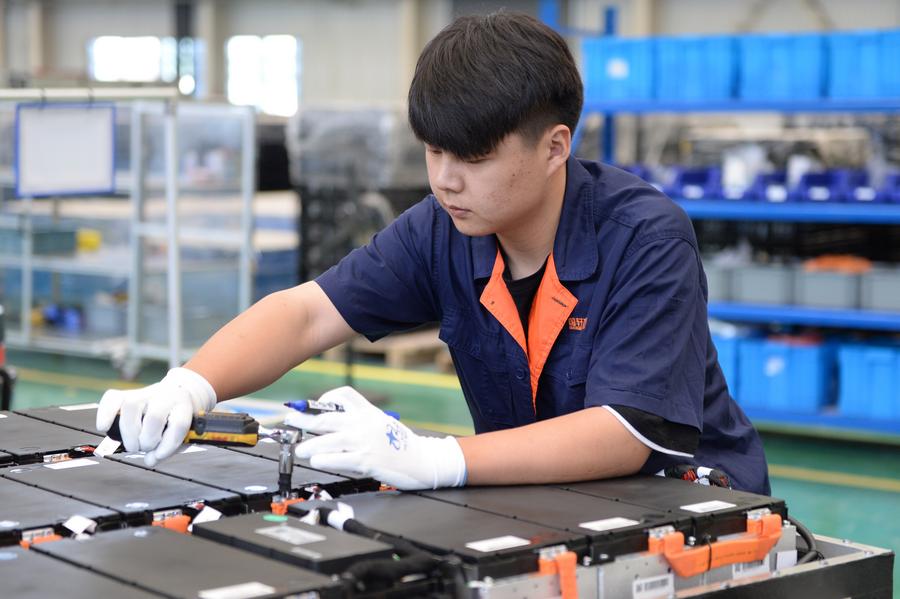
A worker operates at a battery company plant of Gotion High-tech Co., Ltd. in Hefei, east China's Anhui Province, June 19, 2020. (Xinhua/Huang Bohan)
The EU aims for net-zero emissions by 2050 and hopes to have at least 30 million zero-emission cars on European roads by 2030. EVs are crucial for this transition as road transport accounts for nearly a quarter of the EU's greenhouse gas emissions.
Chinese vehicles have the potential to meet the EU's need for sustainable transport. "It shows that Maltese consumers and companies, and even the operator of public transport, find Chinese vehicles very reliable," said Malta's Transport Minister Chris Bonett. "Green is the way we have to go as an economy."
"There is no way that any part of the world can go green, fast and dedicated without China, because then the cost will be much, much higher," said Erik Solheim, co-chair of the Europe-Asia Center and former under-secretary-general of the United Nations.
He noted that Chinese companies, both startups and established firms, are investing heavily in the research and development of new energy vehicles technologies, including advancements in batteries and charging infrastructure.
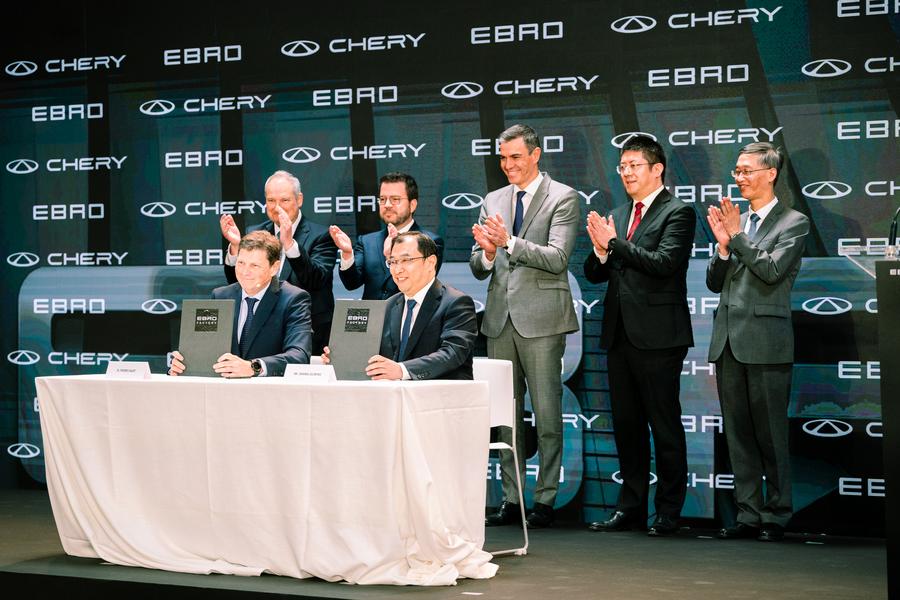
This photo taken on April 19, 2024 shows a scene at the signing event for an agreement between Spain's auto company Ebro-EV Motors and China's Chery Automobile in Barcelona, Spain. (Photo by Joan Gosa/Xinhua)
COOPERATION OUTSMARTS PROTECTIONISM
The China Chamber of Commerce to the EU (CCCEU) on Wednesday stressed the complementarity and opportunities between China and the EU in the battery EV sector.
"The combination of European car brands' esteemed reputation with China's battery EV manufacturing innovation not only facilitates European companies' access to market and development opportunities in China, the world's largest EV market, but also boosts the global competitiveness of European local car brands," the CCCEU said.
In fact, China and the EU have a history of beneficial cooperation in the EV sector, exemplified by several successful joint ventures throughout the EV industrial and supply chains.
Volkswagen CEO Oliver Blume, while attending an event at the Beijing Auto Show in April, stressed, "no other region of the world has a transformation of the automotive industry that is as fast-paced as in China."
"This market has become something of a fitness center for us," he said. "We have to work harder and faster to keep up."
Gotion InoBat Batteries (GIB), a joint venture between Slovak InoBat and Chinese private battery company Gotion High-Tech, will create approximately 1,500 jobs with the construction and operation of a factory in Slovakia.
Slovak Minister of Economy Denisa Sakova highlighted the importance of the battery factory for the future of the automotive industry and electromobility in Europe.
In April, Spanish auto company Ebro-EV Motors and China's Chery Automobile signed a pact to develop new electric vehicles through a joint venture in Barcelona.
Under the alliance, Chery will become the first Chinese automaker to produce vehicles in Europe, using Ebro's facilities located at a former Nissan plant that closed in 2021. The joint venture, located in the Zona Franca port area of Barcelona, will create 1,250 jobs and is projected to produce 50,000 vehicles in 2027, and triple to 150,000 in 2029.
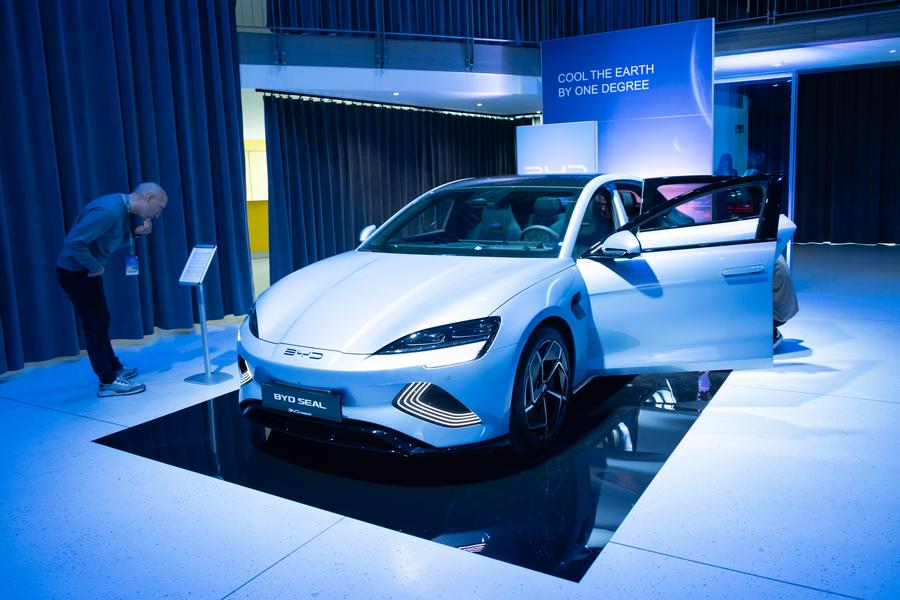
A man looks at a BYD electric vehicle in Budapest, Hungary, Oct. 17, 2023. (Photo by Attila Volgyi/Xinhua)
In December 2023, China's EV giant BYD announced the construction of a new energy vehicle production base in Szeged, Hungary. The project is expected to be built in stages and create thousands of jobs locally.
"The localization strategy of Chinese companies in Europe and talent cultivation contribute to Europe's establishment of its own battery EV supply chain ecosystem," said the CCCEU.
Regarding Europe as an important strategic market, the CCCEU said Chinese electric vehicle and related industry companies remain committed to investing in the region, supporting its efforts in achieving dual-carbon goals and facilitating its green transformation.
点击右上角![]() 微信好友
微信好友
 朋友圈
朋友圈

请使用浏览器分享功能进行分享
